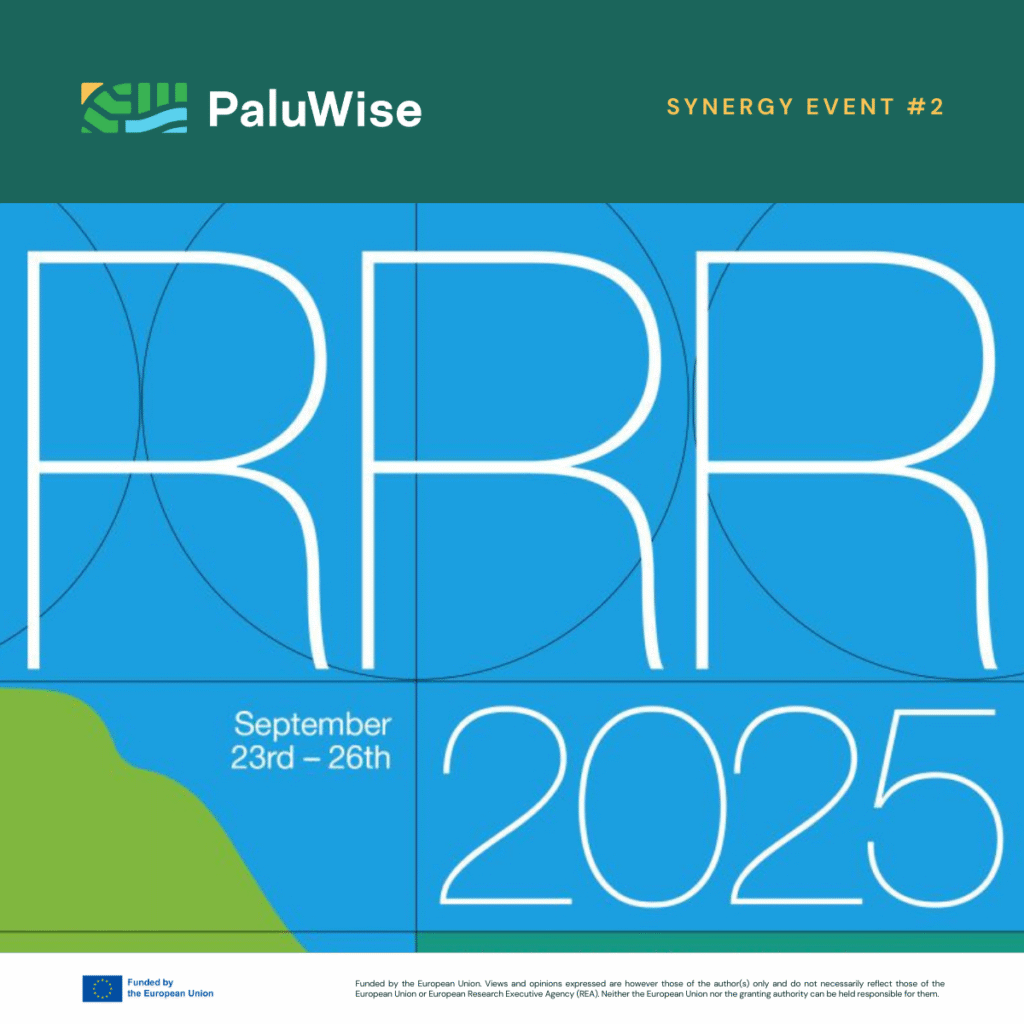We’re excited to announce that PaluWise, along with our sister projects Palus Demos and Paludi4All, is participating in the RRR2025 Conference, 4th International Conference on the Utilisation of Wetland Plants. Taking place from September 23-26 in Greifswald, Germany, this event is a crucial platform for exploring the future of paludiculture and wetland restoration.
RRR2025 – 4th International Conference on the Utilisation of Wetland Plants
The RRR2025 conference is about Renewable Resources from Wet and Rewetted Peatlands. For the 4th time, it aims to unite a diverse range of stakeholders, including scientists, landowners, policymakers, businesses, and conservationists. This platform is designed to explore critical questions, such as how peatland rewetting and innovative land-use concepts can contribute to climate change mitigation. The focus will be on discussing creative strategies for creating and strengthening regional value chains and overcoming barriers to enable a just transition to sustainable peatland use. By fostering dialogue between science and practice, the event encourages knowledge exchange, builds networks, and strengthens practical, forward-looking solutions.
That’s why we feel this is an important place to be.
The power of the holistic approach
PaluWise is thrilled to join forces with our sister projects, Palus Demos and Paludi4All, at RRR2025. All with different, but complimentary mission and goals, in this way, we’re taking a holistic approach to the future of wetland restoration.
-
PALUWISE is about mitigating climate change with paludiculture.
-
PALUS DEMOS is about paludiculture for sustainable agriculture in wetlands.
- PALUDI4ALL is about assessing paludiculture’s socio-economic and environmental impact.
The synergy between PaluWise, Palus Demos, and Paludi4All offers a complete, integrated approach to peatland management. PaluWise focuses on cutting-edge research and data-driven tools to provide the scientific foundation. PalusDemos translates this knowledge into practical, on-the-ground demonstrations, proving the effectiveness of innovative techniques. Finally, Paludi4All ensures that our solutions are inclusive, engaging communities and fostering a collective commitment to long-term sustainability. By bringing these three pillars together, we’re not just presenting research, we’re showcasing a full-circle strategy from discovery to implementation and community adoption. Powerful, right?
Workshops and key discussion on Paludiculture
The final RRR2025 programme is now online, and we’re proud to confirm the participation of the PaluWise team in several workshops. These interactive sessions are designed for deep-dives into topics that are essential for the future of sustainable wetland solutions.
- “Wetland transitions: Opportunities and trade-offs for paludiculture in reaching nature restoration targets”, Tuesday – 23rd September 2025 (Quadra, Gabrielle; Rabelo Fritz, Christian; Van Giersbergen, Quint’ Heuts, Tom; Klimkowska, Agata)
-
- With growing attention on nature restoration laws and the need for sustainable land use alternatives, paludiculture offers a promising solution. But where can paludiculture be most effectively implemented? In this interactive co-creation workshop, we aim to optimise paludiculture implementation in Europe, by bringing together researchers, policymakers, land managers, and industry stakeholders. Using wetland and greenhouse gas hotspot maps, we will explore where nature restoration goals align with paludiculture opportunities, considering soil conditions, hydrology, and socio-economic feasibility, and where trade-offs may occur. Our main goal is the co-creation of a roadmap for paludiculture implementation by identifying key hotspots in Europe, evaluating trade-offs, and aligning opportunities with nature restoration goals. This session fosters collaboration and knowledge exchange, bringing together participants to explore challenges, identify synergies, and develop practical pathways for scaling up paludiculture while balancing ecological, economic, and social factors. Join us in shaping the future of sustainable wetland use and integrating paludiculture into nature restoration!
- “Unlocking the Potential of Alternative Fibre Sources: Challenges, Solutions, and the Path Forward”, Tuesday – 23rd September 2025
(Quadra, Gabrielle; Lång, Kristiina; Alonso Adame, Alba; Varão, Pedro) -
- Adopting alternative fibrous feedstocks in industrial production presents numerous opportunities but significant bottlenecks. This roundtable discussion will bring together industry representatives, primary producers, and policymakers to exchange insights on overcoming key challenges and identifying viable solutions. Key discussion topics are:
(1) addressing the biggest obstacles in integrating fibrous feedstocks and exploring practical innovations;
(2) defining critical quality parameters and identifying gaps in certification, including the potential for CE certification;
(3) examining the role of carbon credits, sustainability requirements, and market dynamics in decision-making; and
(4) discussing legal uncertainties and policy gaps that impact the scalability of alternative fibre sources.
The FIBSUN and PALUWISE projects are among the organisers. They support the development of resilient and competitive production systems while enhancing the provision of ecosystem services from degraded soils. This discussion will contribute to the ongoing dialogue on sustainable industrial transitions. While the session is closed to ensure focused exchange, we may publish a public summary or paper with the consent of participants to share key insights with the broader conference community.
- Adopting alternative fibrous feedstocks in industrial production presents numerous opportunities but significant bottlenecks. This roundtable discussion will bring together industry representatives, primary producers, and policymakers to exchange insights on overcoming key challenges and identifying viable solutions. Key discussion topics are:
Our aim is to offer attendees the chance to move beyond passive listening and engage in valuable peer-to-peer training and knowledge exchange. Join us!
See the full programme here.
See you at RRR2025
We are all aware that the community of paludiculture is not bit enough. It is through powerful synergies like this one that we can develop more effective, holistic solutions for environmental challenges. That is why we look forward to seeing you in Greifswald to share our work, learn from yours, and collectively advance the field of wetland restoration.
See you in Germany!
Lorem Ipsum is simply dummy text of the printing and typesetting industry. Lorem Ipsum has been the industry’s standard dummy text ever since the 1500s, when an unknown printer took a galley of type and scrambled it to make a type specimen book. It has survived not only five centuries, but also the leap into electronic typesetting, remaining essentially unchanged. It was popularised in the 1960s with the release of Letraset sheets containing Lorem Ipsum passages, and more recently with desktop publishing software like Aldus PageMaker including versions of Lorem Ipsum.

